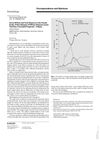 38 citations,
September 2006 in “Journal of Dermatological Science”
38 citations,
September 2006 in “Journal of Dermatological Science” Ketoconazole lotion can improve hair regrowth for some people with androgenetic alopecia.
 38 citations,
February 2002 in “British journal of dermatology/British journal of dermatology, Supplement”
38 citations,
February 2002 in “British journal of dermatology/British journal of dermatology, Supplement” Two patients with porphyria cutanea tarda experienced their grey hair turning dark again.
 38 citations,
October 1988 in “Clinics in Dermatology”
38 citations,
October 1988 in “Clinics in Dermatology” Minoxidil can help grow hair and make hair follicles bigger, but it can also cause side effects.
 37 citations,
December 2007 in “International journal of clinical practice”
37 citations,
December 2007 in “International journal of clinical practice” Hirsutism is excessive male-pattern hair growth in women, often caused by hormonal imbalances, and requires ongoing treatment to manage.
 37 citations,
September 2007 in “International Journal of Pharmaceutics”
37 citations,
September 2007 in “International Journal of Pharmaceutics” PPCM microspheres allow controlled finasteride release over 24 hours.
 37 citations,
October 2006 in “Steroids”
37 citations,
October 2006 in “Steroids” New sulfur-containing steroid analogs show promise for more targeted medical treatments.
 36 citations,
April 2016 in “Experimental Dermatology”
36 citations,
April 2016 in “Experimental Dermatology” Photobiomodulation may help with hair growth and wound healing, but research is inconsistent and needs better quality studies.
 36 citations,
December 2015 in “Drugs”
36 citations,
December 2015 in “Drugs” New treatments for a chronic skin condition show promise, but individualized plans are crucial due to varying responses.
 36 citations,
October 2014 in “Langmuir”
36 citations,
October 2014 in “Langmuir” Bleaching hair removes its protective top layer and exposes more hydrophilic groups, changing its chemical surface and affecting how it interacts with products.
 35 citations,
March 2014 in “British Journal of Dermatology”
35 citations,
March 2014 in “British Journal of Dermatology” Hair loss in male pattern baldness involves muscle degeneration and increased scalp fat.
 35 citations,
June 2012 in “Journal of Clinical Psychopharmacology”
35 citations,
June 2012 in “Journal of Clinical Psychopharmacology” Finasteride reduces gambling symptoms in Parkinson's patients.
 34 citations,
February 1999 in “Journal of Dermatological Science”
34 citations,
February 1999 in “Journal of Dermatological Science” Minoxidil boosts enzymes that help hair growth.
 34 citations,
April 1973 in “The American journal of clinical nutrition”
34 citations,
April 1973 in “The American journal of clinical nutrition” Not enough vitamin B6 in pregnant rats' diets caused poor development and health in their babies.
 33 citations,
January 2011 in “Elsevier eBooks”
33 citations,
January 2011 in “Elsevier eBooks” Systemic Lupus Erythematosus has varied symptoms and is hard to diagnose, affecting many body parts and requiring careful clinical judgment.
 33 citations,
October 2004 in “Archives of Dermatological Research”
33 citations,
October 2004 in “Archives of Dermatological Research” Large prostate links to more hair loss, but age of onset doesn't affect it.
 33 citations,
October 1994 in “The Journal of Clinical Endocrinology and Metabolism”
33 citations,
October 1994 in “The Journal of Clinical Endocrinology and Metabolism” Finasteride reduces hair growth and is safe for women with excessive hair.
 32 citations,
June 2017 in “Journal of Pharmaceutical Sciences”
32 citations,
June 2017 in “Journal of Pharmaceutical Sciences” Chitosan-coated nanoparticles improve skin delivery of hair loss treatments with fewer side effects.
 32 citations,
June 2015 in “Dermatologic Therapy”
32 citations,
June 2015 in “Dermatologic Therapy” Finasteride and minoxidil together work best for male hair loss.
 31 citations,
April 2019 in “Cell reports”
31 citations,
April 2019 in “Cell reports” Patient-derived melanocytes can potentially treat vitiligo by restoring skin pigmentation.
 30 citations,
February 1994 in “Journal of Cutaneous Pathology”
30 citations,
February 1994 in “Journal of Cutaneous Pathology” A woman's hair loss was initially mistaken for a common hair loss condition but was later found to be caused by breast cancer cells in her scalp.
 29 citations,
September 2004 in “Fertility and Sterility”
29 citations,
September 2004 in “Fertility and Sterility” Intermittent low-dose finasteride works as well as daily use for treating excessive hair growth in women.
 29 citations,
January 2003 in “Dermatology”
29 citations,
January 2003 in “Dermatology” The condition called 'acute diffuse and total alopecia of the female scalp' is actually a known condition named alopecia areata incognita.
 29 citations,
September 1983 in “British Journal of Dermatology”
29 citations,
September 1983 in “British Journal of Dermatology” Men with hair loss have lower SHBG and higher saliva testosterone levels, suggesting increased androgen activity.
 28 citations,
November 2020 in “Fluid Phase Equilibria”
28 citations,
November 2020 in “Fluid Phase Equilibria” Minoxidil dissolves better in propylene glycol + water than in supercritical CO2.
 28 citations,
March 2007 in “Journal of The European Academy of Dermatology and Venereology”
28 citations,
March 2007 in “Journal of The European Academy of Dermatology and Venereology” At least 87% of Indian men experience hair loss, with type II being most common and severity increasing with age.
 28 citations,
August 2003 in “Steroids”
28 citations,
August 2003 in “Steroids” Hirsute women have lower type 2 17β-HSD enzyme levels, which improve with treatment.
 28 citations,
January 2003 in “Skin pharmacology and physiology”
28 citations,
January 2003 in “Skin pharmacology and physiology” Melatonin affects skin cell growth differently based on how much and how long it's used.
 27 citations,
July 2009 in “Experimental and Clinical Endocrinology & Diabetes”
27 citations,
July 2009 in “Experimental and Clinical Endocrinology & Diabetes” Finasteride safely reduces excessive hair growth in women.
 27 citations,
August 1999 in “Urology”
27 citations,
August 1999 in “Urology” Finasteride improves urinary function in men for 2 years.
 27 citations,
September 1992 in “The Lancet”
27 citations,
September 1992 in “The Lancet” ICL is a condition with low CD4+ T cells like AIDS but not caused by HIV, and normal CD4+ T cell counts may vary between men and women.






























